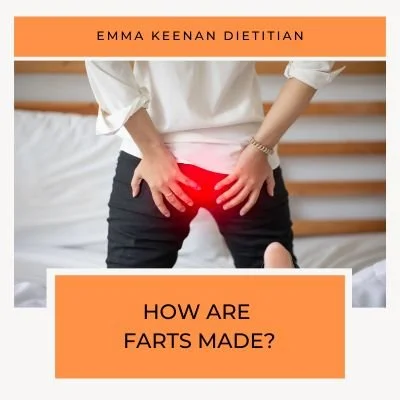Why Do We Fart? The Science of Digestive Gas
Let’s be honest: farts are a normal part of life.
Whether they make you giggle or make you want to evacuate the room, everyone does it. However, for some, excessive gas (flatulence) isn’t just a social worry — it’s a source of physical distress, bloating, and abdominal pain.
As a dietitian, I help clients understand that gas is actually a sign of a busy, working gut. Here is the science behind what’s happening in there.
WHAT Gases ARE FARTS MADE OF?
You might be surprised to learn that 99% of intestinal gas is odourless. It is primarily composed of:
Hydrogen
Carbon Dioxide
Methane
So, why do farts smell? The “stinky” factor comes from the remaining 1% — specifically sulfur-containing gases. These are usually produced when your gut breaks down amino acids found in animal proteins like red meat, poultry, eggs, milk, and cheese.
WHERE DOES Fart Gas COME FROM?
There are four primary ways gas enters your digestive system:
Swallow Air: Eating or drinking too quickly (aerophagia).
Chemical Reactions: Carbon dioxide is produced when stomach acid meets food or alkaline secretions in the small intestine.
Bacterial Fermentation: This is the big one! Gut bacteria feast on undigested carbohydrates, producing hydrogen and methane.
Bloodstream Transfer: Gases can actually move from your blood into your gastrointestinal tract.
HOW Does Gas Leave the Body?
Interestingly, farts aren’t the only exit strategy. Gas is eliminated via three pathways:
Pathway 1: Expelled though the anus (farts).
Pathway 2: Absorbed into the blood and exhaled via the lungs.
Pathway 3: Metabolised by “gas consuming” bacteria in your microbiome
Did you know? A study found that only 23% of gas is eliminated as flatulence. The other 77% is quietly handled by your breath and your gut bacteria!
WHAT IS A NORMAL Amount of Farting?
A study by Thomlin, Lowis, and Read used rectal catheters and collection bags to track gas production in healthy volunteers.
The finding were fascinating:
Volume: Healthy adults produce between 476ml and 1491mL of gas per day.
Gender: Men and women expel similar amounts of gas.
Dietary Impact: High-fibre diets (including baked beans) significantly increase gas volume.
Timing: Gas production is fastest after meals and slowest overnight.
WHICH FOODS Cause the Most Gas?
The main culprits are high-fibre foods and "short-chain carbohydrates" that aren't fully absorbed in the small intestine. When these reach the large intestine, they attract water and are rapidly fermented by bacteria.
In the clinical world, we call these FODMAPs:
Fermentable
Oligosaccharides (e.g., lentils, beans)
Disaccharides (e.g., milk/lactose)
Monosaccharides (e.g., high-fructose fruits)
Polyols (e.g., sorbitol in sugar-free gum)
HOW TO REDUCE Excessive FARTING?
If your gas is causing distress, you don’t have to just “deal with it”.
1. The 3-Phase FODMAP Diet
For those with Irritable Bowel Syndrome (IBS), we use structured 3-phase approach:
Phase 1 (Elimination): Removing high-FODMAP triggers.
Phase 2 (Reintroduction): Systematic testing to find your specific triggers.
Phase 3 (Personalisation): Expanding your diet to include as many foods as possible while staying comfortable.
2. Slow and Steady Fibre
If you are increasing your fibre, start slow. Interestingly, research shows that is you start eating more legumes, your gas production peaks early but returns to normal levels after about 2 weeks. Your gut bacteria and breath-elimination pathways actually “train” themselves to handle the extra load!
Struggling with Bloating or Gas?
You don’t need to feel embarrassed. As a gut health dietitian, I talk about this every day and I can help you:
Identify your specific food triggers.
Balance your fibre intake for “happy bowels”
Develop lifestyle strategies to reduce air swallowing and improve motility.
I will leave you with some childish wisdom
Beans, Beans, the Musical Fruit Song Lyrics
Beans, beans, the musical fruit
The more you eat, the more you toot
The more you toot, the better you feel
So we have beans at every meal!
Beans, beans, they’re good for your heart
The more you eat, the more you fart
The more you fart, the happier you feel
So let’s eat beans with every meal
Beans, beans, they’re good for your heart
The more you eat, the more you fart
The more you fart, the more you eat
The more you sit on the toilet seat
Beans, beans, they give you gas
They make you fart, and burn your ass
The more you eat, the more it hurts
So slow down your eating to stop the squirts





